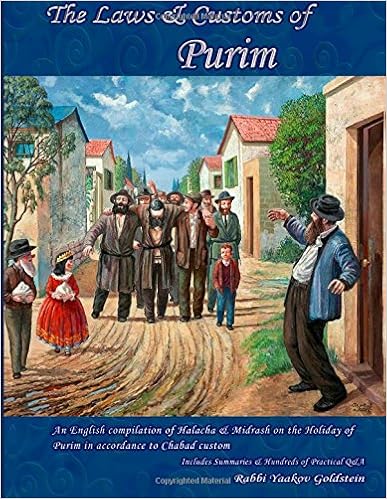
This article is an excerpt from our Sefer

Buy me on Amazon.com
Reading the Megillah in a different language: [1]
It is invalid to read the Megillah in a language that is different than the language written in the Megillah.[2] If however the Megillah is written in another language [in a way that the Megillah remains Kosher[3]] then it is valid to be read in that language for those people that understand the language.[4] However anyone who does not understand that language does not fulfill his obligation.[5] Furthermore some opinions rule that if one understands Lashon Hakodesh, he must hear the Megillah in Lashon Hakodesh, and he does not fulfill his obligation with hearing the Megillah in another language.[6] Thus one is to protest against those that read the Megillah for women in a different language.[7] Practically the custom is to only write the Megillah in Ashuris in Lashon Hakodesh and read it in Lashon Hakodesh.[8]
Summary:
The Megillah is to be written and read in Lashon Hakodesh. In a time of need, if certain conditions are met, the Megillah is valid if it is written by a scribe on parchment in a different language, and is read in that language to people who understand the language. Printed paper Megillahs are completely invalid according to all.
[1] 690/9
[2] The reason: As this is considered as if one is reading the Megillah by heart. [Michaber ibid] The novelty here is that although one is looking inside the Megillah, and translating each word as he goes along, nevertheless it is invalid. [M”B 690/30]
[3] Meaning it was written with ink on parchment following all the laws of a Kosher Megillah.
May the Megillah be written in the foreign language? The Rama ibid rules the Megillah is valid even if it is written in a foreign language. Thus, in his opinion, if a scribe wrote the Megillah in English it can be read in English to all those that understand English. [So also rules: Beis Yosef; Rambam; Beis David 488; Ritva; Rashba; Ridbaz 126] However other Poskim rule the Megillah is only valid if it is written in Hebrew letters. Hence even the foreign languages have to be transliterated in Hebrew. [So rules Riaz brought in Shiltei Giborim Megillah chapter 2; Rashbatz 1/8; Meiri; Peri Chadash; Gr”a; Reb Akiva Eiger] Practically the main Halachic ruling follows the former opinion, although the custom is like the latter opinion to write the Megillah in Ashuris in Lashon Hakodesh and read it in Lashon Hakodesh. [Levush 690/11; Shulchan Gavoa 690/23; Kaf Hachaim 690/55-56; Biur Halacha 690 “Beizeh”; M”B 690/32] According to the lenient opinion a Megillah written in a foreign language is not required to be surrounded by empty space on the parchment. [Kaf Hachaim 690/54 based on Biur Halacha “Aval”]
Regarding whether a Megillah may be written in two different languages: A Megillah that is written in two languages, such as Hebrew and English, with some verses in Hebrew and some in English, is valid. [Rama 690/9] Nevertheless initially it is not to contain a translation. [M”B 690/36]
Regarding whether one must write Lashon Hakodesh in Ashuris: This matter is disputed amongst Poskim. The Radbaz 126 and others rule if the Megillah is written in Lashon Hakodesh it must be written in Ashuris. However the Beis Yosef and others rule that even Lashon Hakodesh can be written in any language. [Kaf Hachaim 690/56]
[4] Michaber ibid; However based on M”A 690/12 this would only be permitted Bedieved or in a time of need. However Lechatchilah one may never read the Megillah in another language if a Lashon Hakodesh Megillah and a Lashon Hakodesh reader is available.
The word “Ha’achshtarnim”: According to all the words “Ha’achshtarnim Bnei HaRamachim” must be said in Lashon Hakodesh. [M”B 690/34; Kaf Hachaim 690/62 in name of Beis Yosef]
[5] Michaber ibid; This applies even if the listener understands the language but the reader does not understand the language, nevertheless neither is Yotzei. [M”B 690/32; Kaf Hachaim 690/51] This applies even if the foreign language was written in Ashuris. [M”B 690/27; Kaf Hachaim 690/48] If the reader understands the language but the listener does not, then the reader is Yotzei and not the listener [Kaf Hachaim 690/52]
[6] Michaber 690/9 brings two opinions in Rishonim [Ramban; Ran are stringent; Rashi; Rambam Are lenient]. The Michaber’s first and plain opinion is that one does not fulfill his obligation, and so is the ruling of the Michaber in 690/11. [M”B 690/33 and 37] This dispute applies even if the listener does not understand Lashon Hakodesh but the reader does understand it, nevertheless according to this opinion neither is Yotzei. [M”B 690/37; Kaf Hachaim 690/64] Practically the main opinion follows the stringent opinion, however a blessing is not to be repeated on the repeated reading. [Elya Raba 690/8; Kaf Hachaim 690/61]
[7] Michaber 690/11
The reason: As the readers know Lashon Hakodesh, in which case many Poskim invalidate the reading. [Shulchan Gavoa 690/22; M”B 690/37; Kaf Hachaim 690/64] Alternatively the reason is because they must read the words “Ha’achshtarnim Bnei HaRamachim” in Lashon Hakodesh and initially one may not read the Megillah in two languages. [M”A 690/12 brought in M”B ibid; Kaf Hachaim ibid]
[8] Levush 690/11; Shulchan Gavoa 690/23; Kaf Hachaim 690/55-56; M”B 690/32


Leave A Comment?
You must be logged in to post a comment.